Electric Vehicles
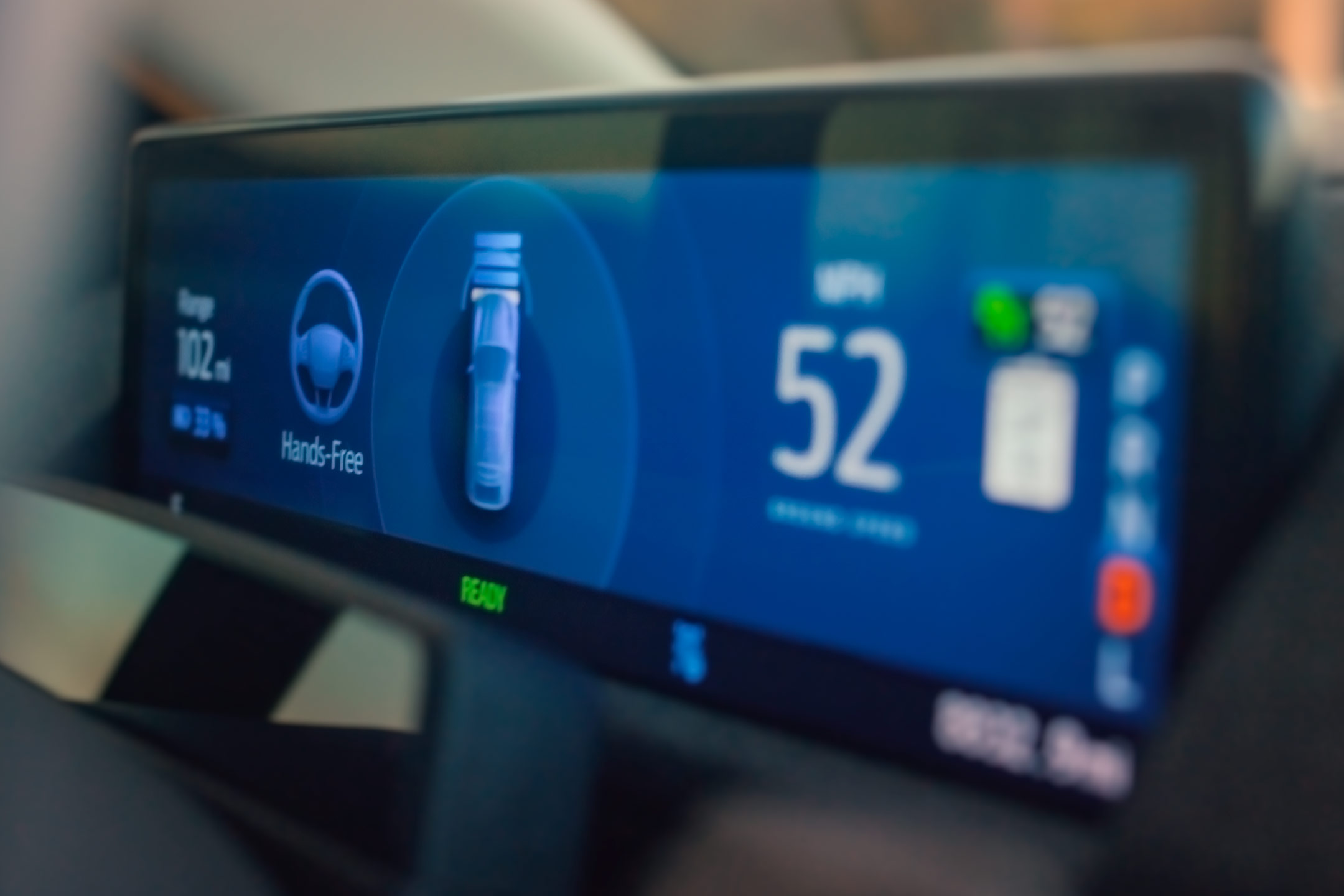
Consumer Reports Rates BlueCruise Tops*
The time-honored consumer organization has named Ford BlueCruise** its top-rated Active Driving Assistance System. Its advanced technology helps keep drivers in control on the highway.
*Consumer Reports does not endorse products or services.
**Includes a three-year connected service plan with regular map updates after which purchase is required. Requires FordPass® App and modem activation. Driver-assist features are supplemental and do not replace the driver’s attention, judgment and need to control the vehicle. Ford BlueCruise is a hands-free highway driving feature. Only remove hands from the steering wheel when in a Hands-Free Blue Zone. Always watch the road and be prepared to resume control of the vehicle. It does not replace safe driving. See Owner’s Manual for details and limitations. 2023 Ford Mustang Mach-E® Select model includes a 90-day trial with the option to purchase a three-year connected service plan with regular map updates. Requires FordPass App and modem activation.
Choose Your Charge
Charging your EV is easy and simple. Ford delivers the technology to help you get on the grid and stay within range.
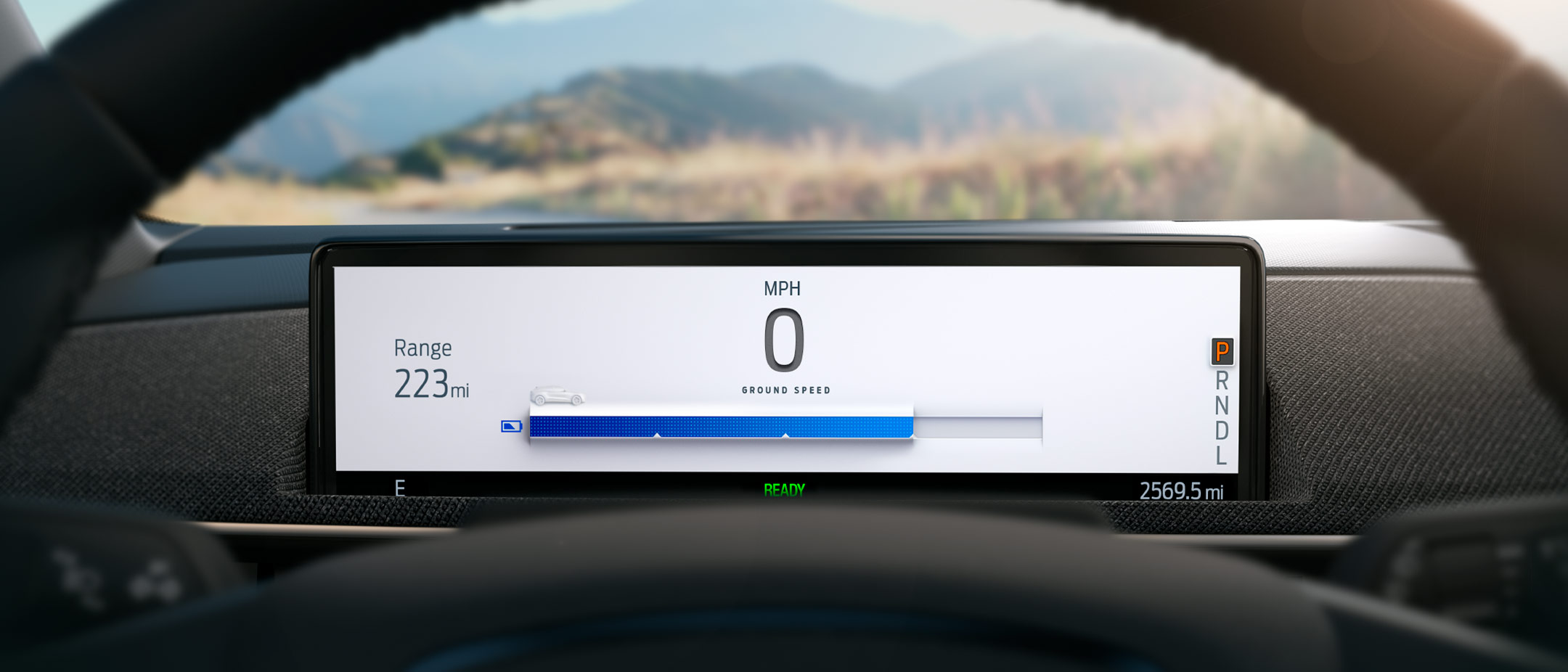
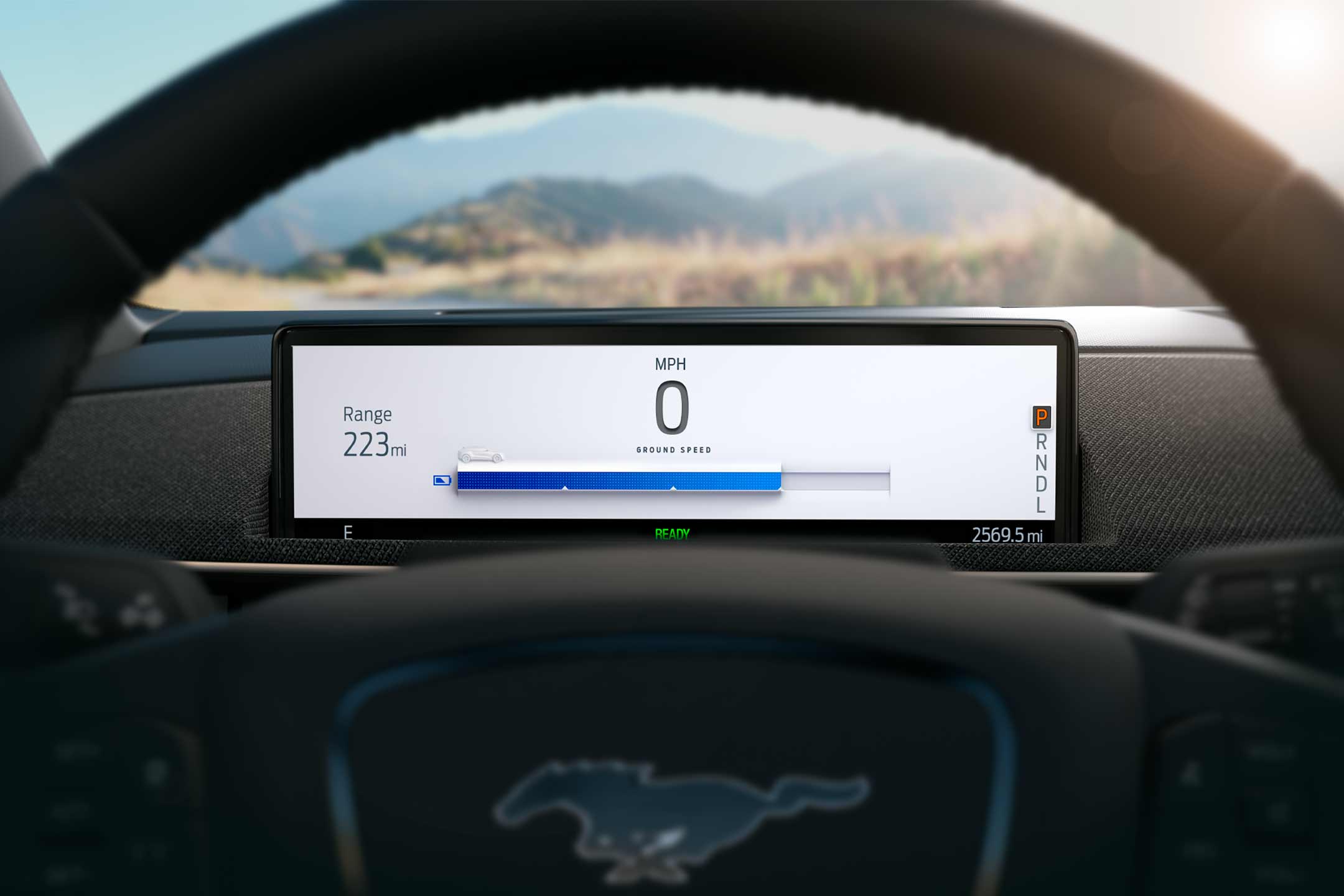
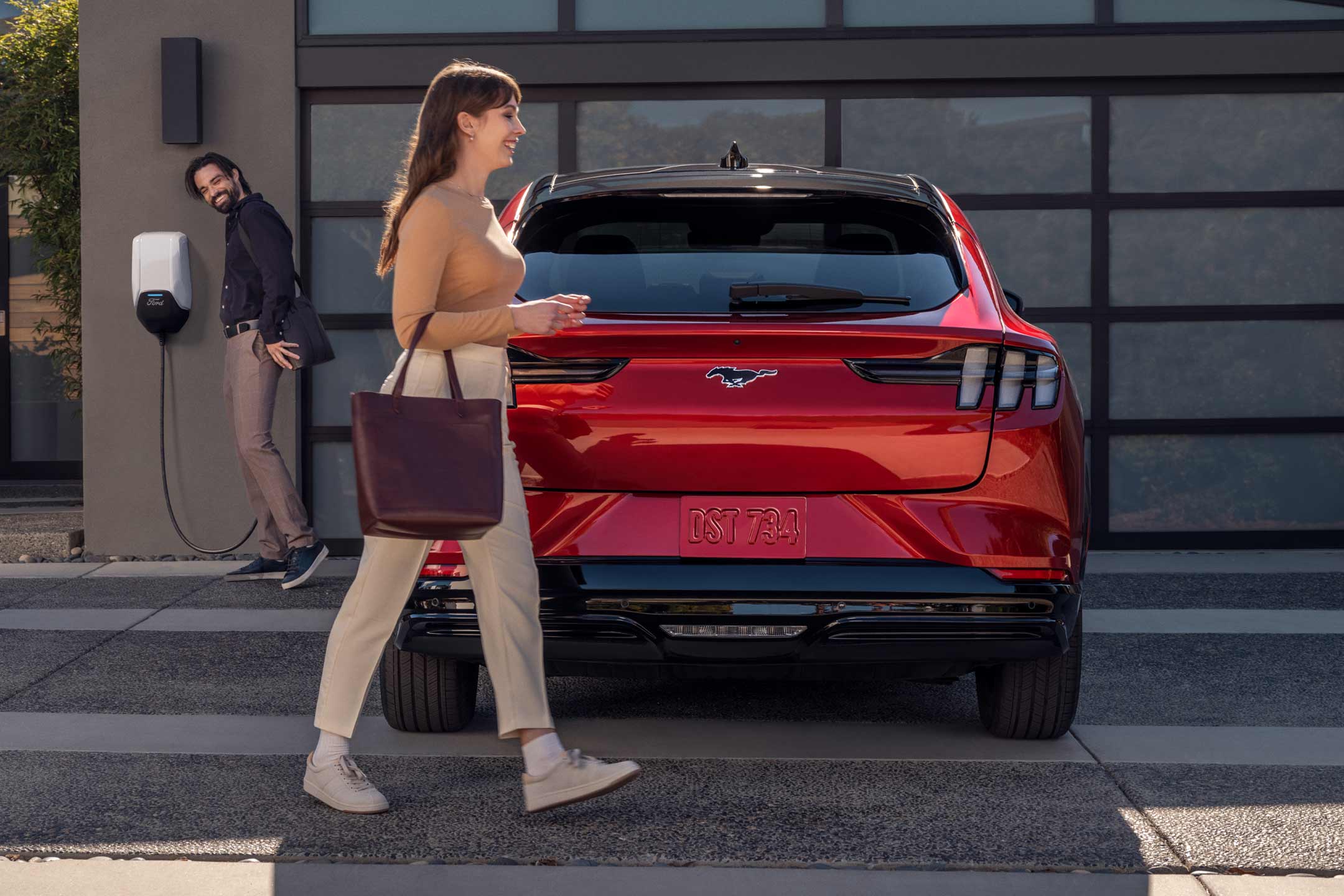
Charging Your EV at Home
EV-driver feedback tells us that most electric vehicle charging happens at home. There are various home charging options available, and the available Ford Connected Charge Station provides an easy and convenient charge whenever you are home.
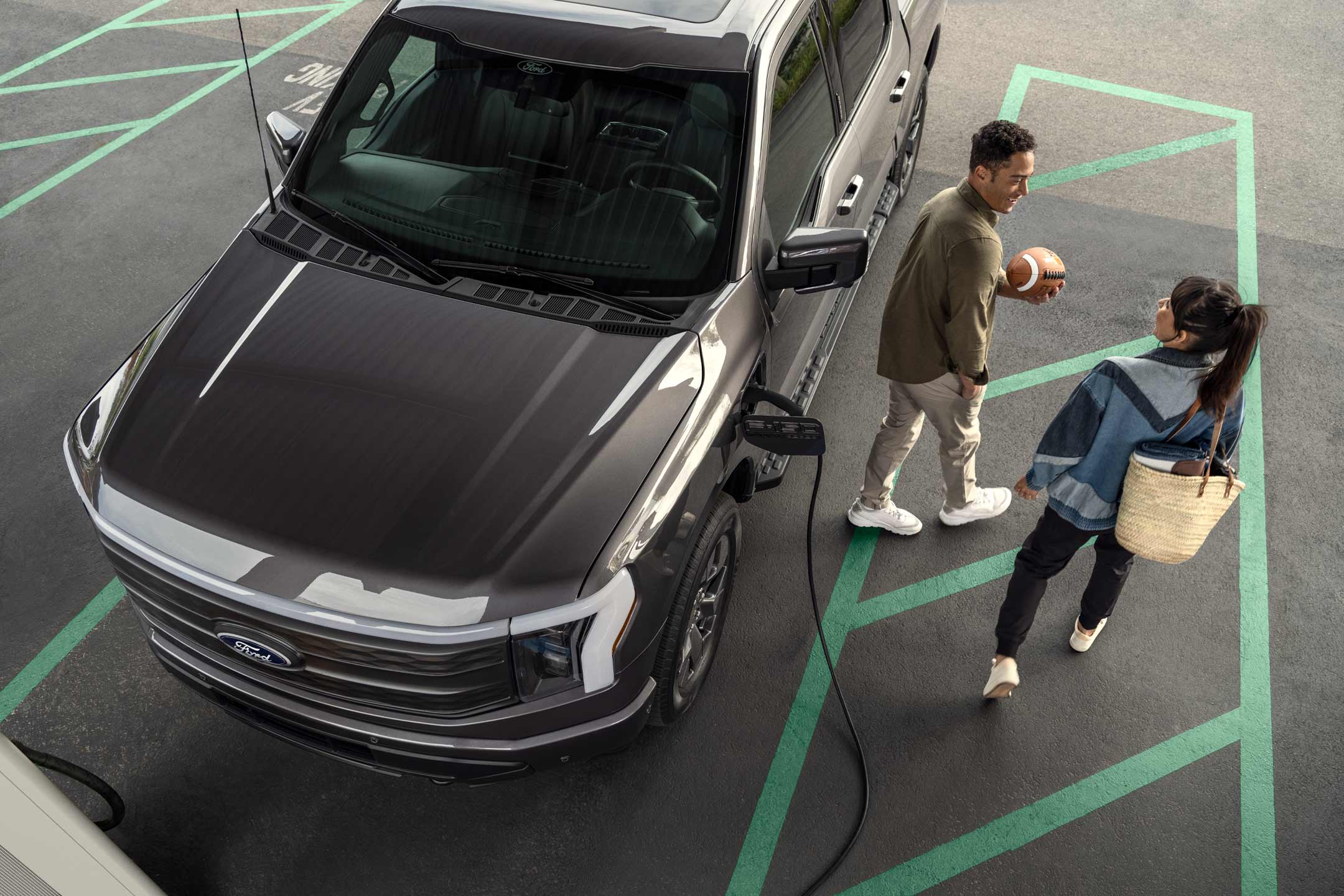
Charging Your EV on the Go
Planning a road trip? Top off on the go. Ford EV customers have easy access to the BlueOval™ Charge Network* — the largest public charging network in North America offered by automotive manufacturers. It has more than 84,000 chargers, and that number keeps growing.
*Based on original equipment manufacturers(OEM)/automotive manufacturers that sell all-electric vehicles and have active charging networks. Department of Energy data as of February 22, 2023 used. Numbers subject to change. FordPass,® compatible with select smartphone platforms, is available via a download. Message and data rates may apply.
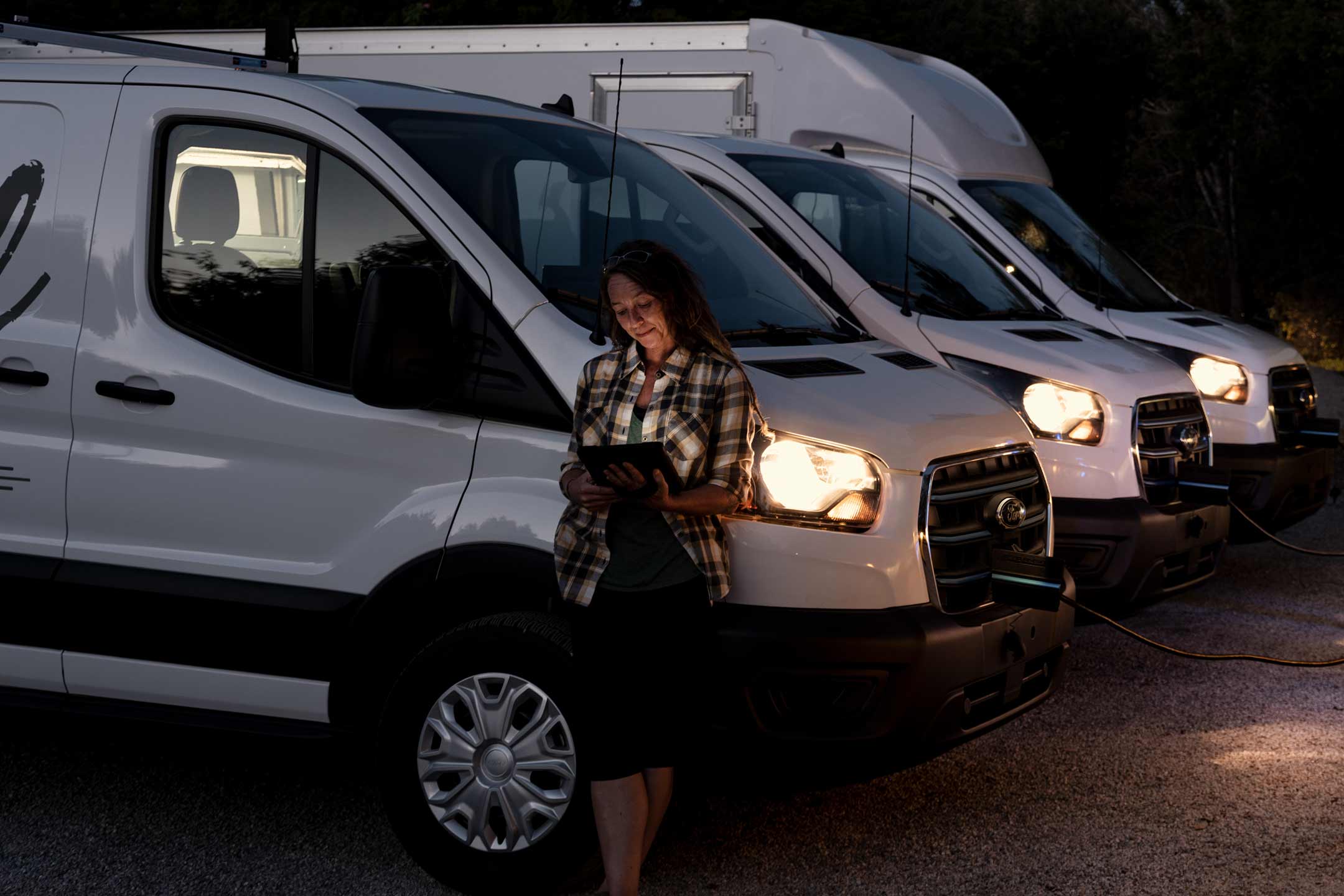
Depot Charging
Planning a road trip? Top off on the go. Ford EV customers have easy access to the BlueOval™ Charge Network* — the largest public charging network in North America offered by automotive manufacturers. It has more than 84,000 chargers, and that number keeps growing.
For on-site charging capability, ask our experts at Ford Pro™ how you can install hardware and software to make sure that when your fleet isn’t on the road, it’s getting ready for it.

Charging Your EV at Home
EV-driver feedback tells us that most electric vehicle charging happens at home. There are various home charging options available, and the available Ford Connected Charge Station provides an easy and convenient charge whenever you are home.

Charging Your EV on the Go
Planning a road trip? Top off on the go. Ford EV customers have easy access to the BlueOval™ Charge Network* — the largest public charging network in North America offered by automotive manufacturers. It has more than 84,000 chargers, and that number keeps growing.
*Based on original equipment manufacturers(OEM)/automotive manufacturers that sell all-electric vehicles and have active charging networks. Department of Energy data as of February 22, 2023 used. Numbers subject to change. FordPass,® compatible with select smartphone platforms, is available via a download. Message and data rates may apply.

Depot Charging
Planning a road trip? Top off on the go. Ford EV customers have easy access to the BlueOval™ Charge Network* — the largest public charging network in North America offered by automotive manufacturers. It has more than 84,000 chargers, and that number keeps growing.
For on-site charging capability, ask our experts at Ford Pro™ how you can install hardware and software to make sure that when your fleet isn’t on the road, it’s getting ready for it.
Schedule Your EV Maintenance for Your Mustang® Mach-E®, F-150® Lightning® or E-Transit™ Van at Montrose Ford
It is important that you have your vehicle serviced at the proper times. These intervals serve two purposes; first is to maintain the reliability of your vehicle and the second is to keep the cost of owning your vehicle down. Montrose Ford recommends that the following inspection be performed. Make sure you perform the following basic maintenance checks and inspections every month or at six-month intervals:
Every Month
- Function of all interior and exterior lights
- Tires (including spare) for wear and proper pressure
- Windshield washer fluid level
Every Six Months
- 12V battery connections and clean if necessary
- Body and door drain holes for obstructions. Clean if necessary
- Inspect vehicle cooling systems strength and hoses
- Door weatherstrips for wear. Lubricate if necessary
- Hinges, latches and outside locks for proper operation. Lubricate if necessary
- Parking brake for proper operation
- Safety belts and seat latches for wear and function.
- Safety warning lamps (brake, ABS, airbag and safety belt) for operation
- Washer spray and wiper operation. Clean or replace blades as necessary
We recommend having the following multi-point inspection performed at every scheduled maintenance interval to help make sure your vehicle keeps running great:
- 12V Battery performance
- Exterior lamps and hazard warning system operation
- Fluid levels and any leaks
- Half-shaft dust boots
- Radiator, cooler, heater and air conditioning hoses
- Suspension components for leaks or damage
- Steering and linkage
- Tires for wear and proper pressure
- Windshield for cracks, chips or pits
- Washer spray and wiper operation
For more information, see your Owner’s Manual or contact Montrose Ford.
Discover More Unique Ford EV Features
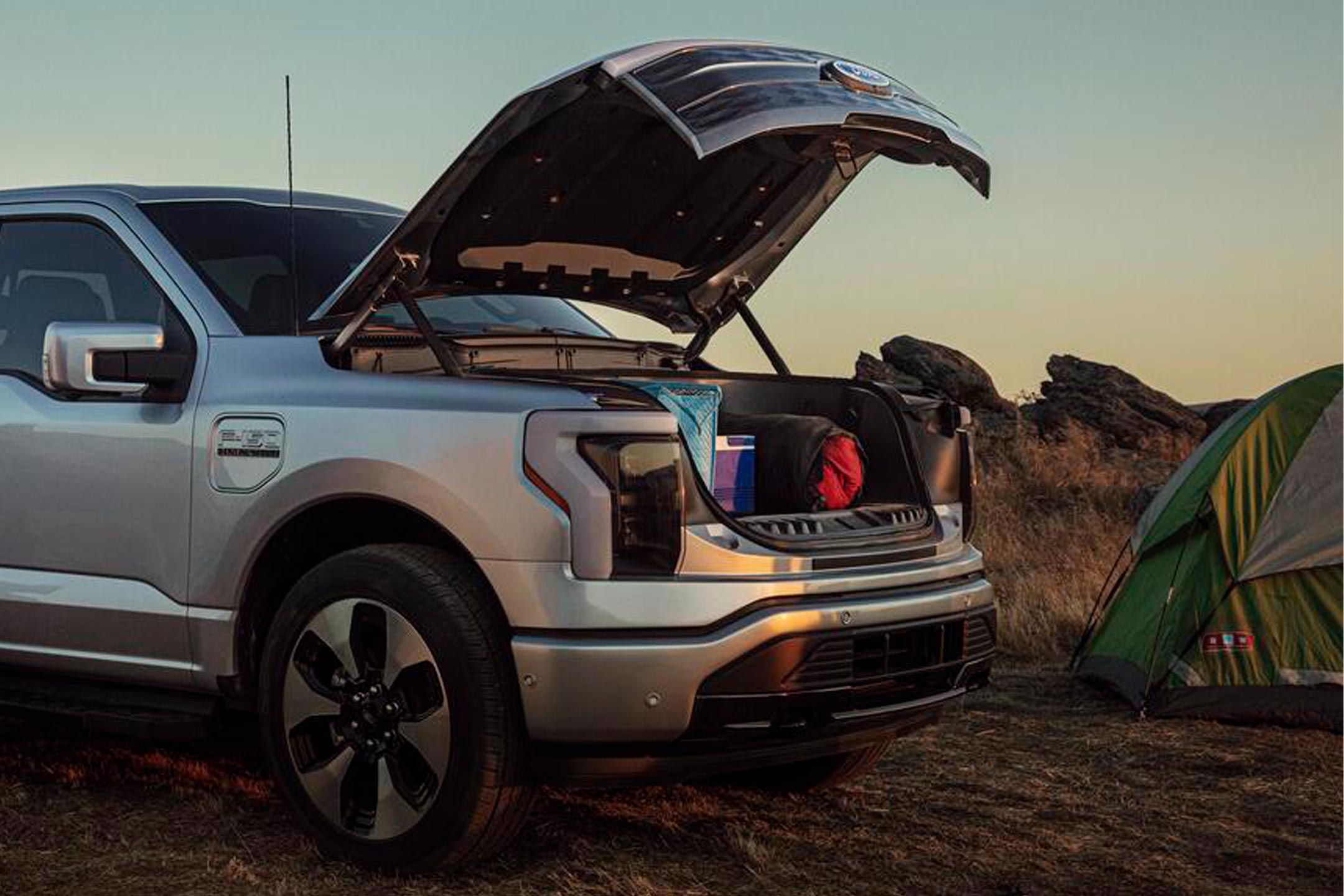
The Mega Power Frunk
With easy access and 14.1 cubic feet of cargo space, there's room for everything from from groceries to tools. A drainable floor is easily hosed out. Equipped with four 120V outlets and two USB charging ports, it delivers the power you need for essential devices including power tools.
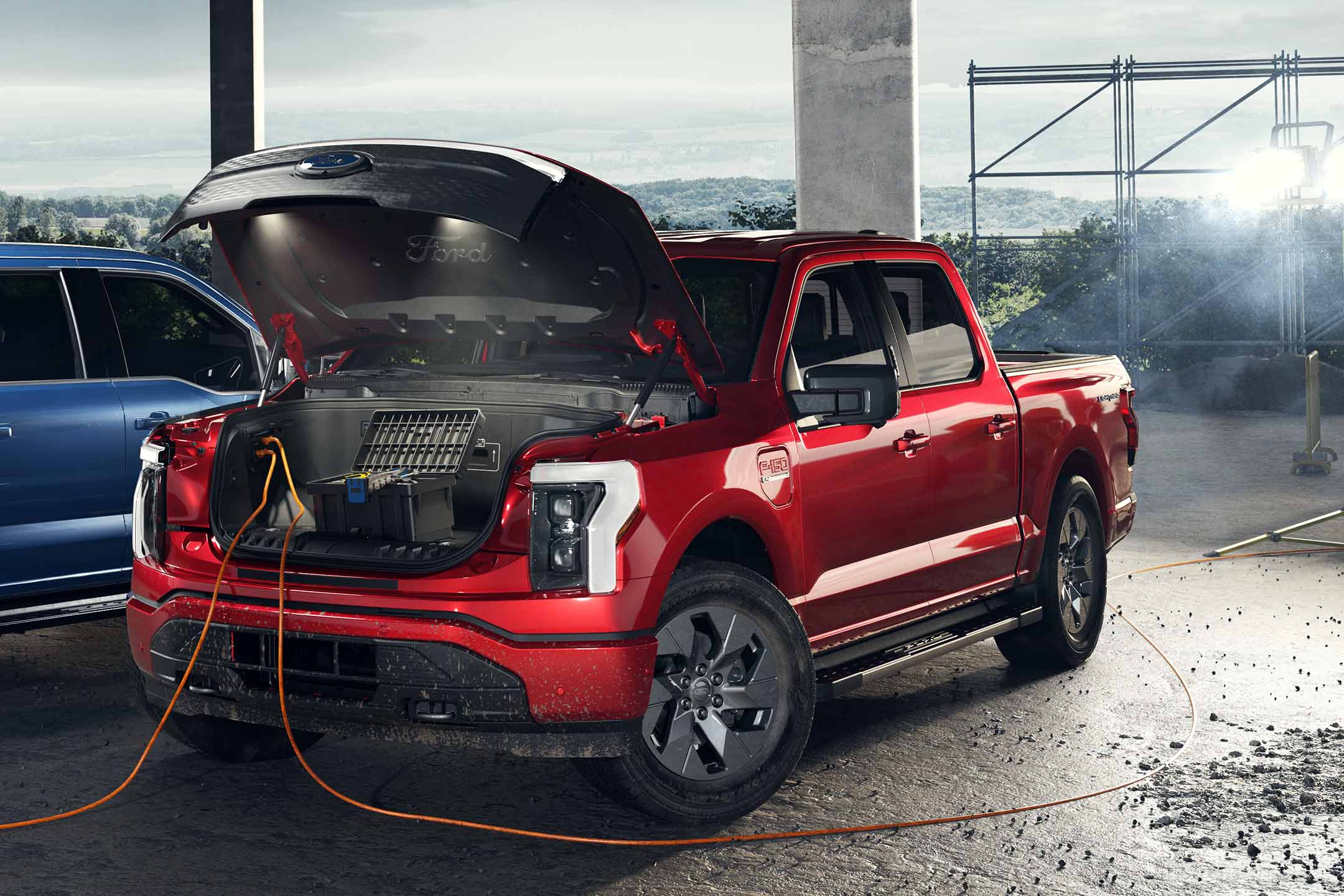
Home Backup Power
If power goes out in your neighborhood, with he extended range battery your F-150® Lightning® has the ability to power your home for three days. Or even up to ten, if usage is properly rationed.*
*When home is properly equipped and home transfer switch disconnects home from the grid. Based on 30 kWh use per day using the F-150 Lightning with the extended-range battery. Your results may vary based on energy usage. Rationing power assumes limiting the number of devices and turning the truck off when not needed.
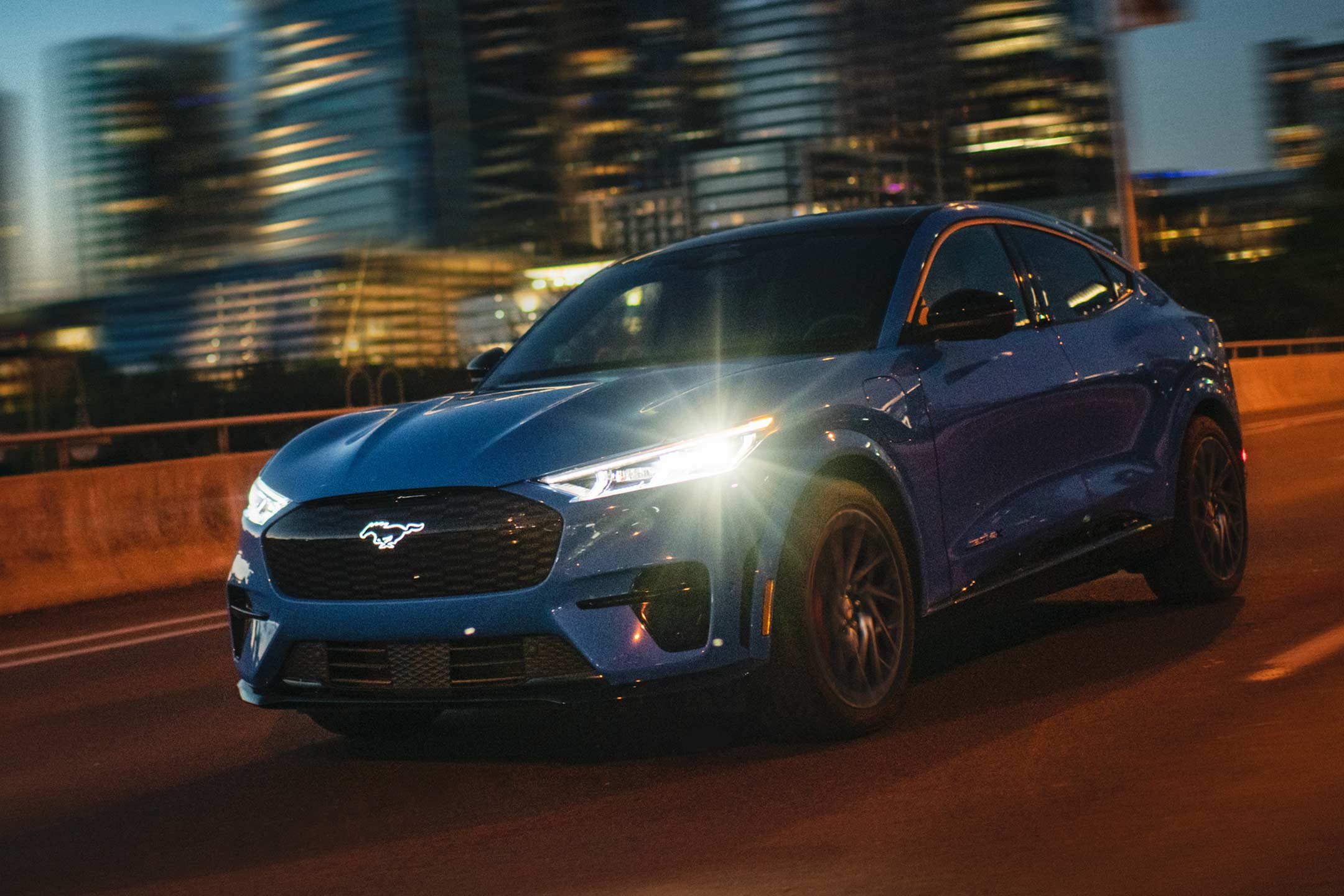
Ford BlueCruise
Available Ford BlueCruise* feature works on prequalified sections of divided highways called Hands-Free Blue Zones which allows you to drive with your hands off the steering wheel as long as you pay attention to the road ahead.
*Available feature. Includes a three-year connected service plan with regular map updates after which purchase is required. Requires FordPass App and modem activation. Driver-assist features are supplemental and do not replace the driver’s attention, judgment and need to control the vehicle. Ford BlueCruise is a hands-free highway driving feature. Only remove hands from the steering wheel when in a Hands-Free Blue Zone. Always watch the road and be prepared to resume control of the vehicle. It does not replace safe driving. See Owner’s Manual for details and limitations. 2023 Ford Mustang® Mach-E® Select includes a 90-day trial with the option to purchase a three-year connected service plan with regular map updates. Requires the FordPass App and modem.
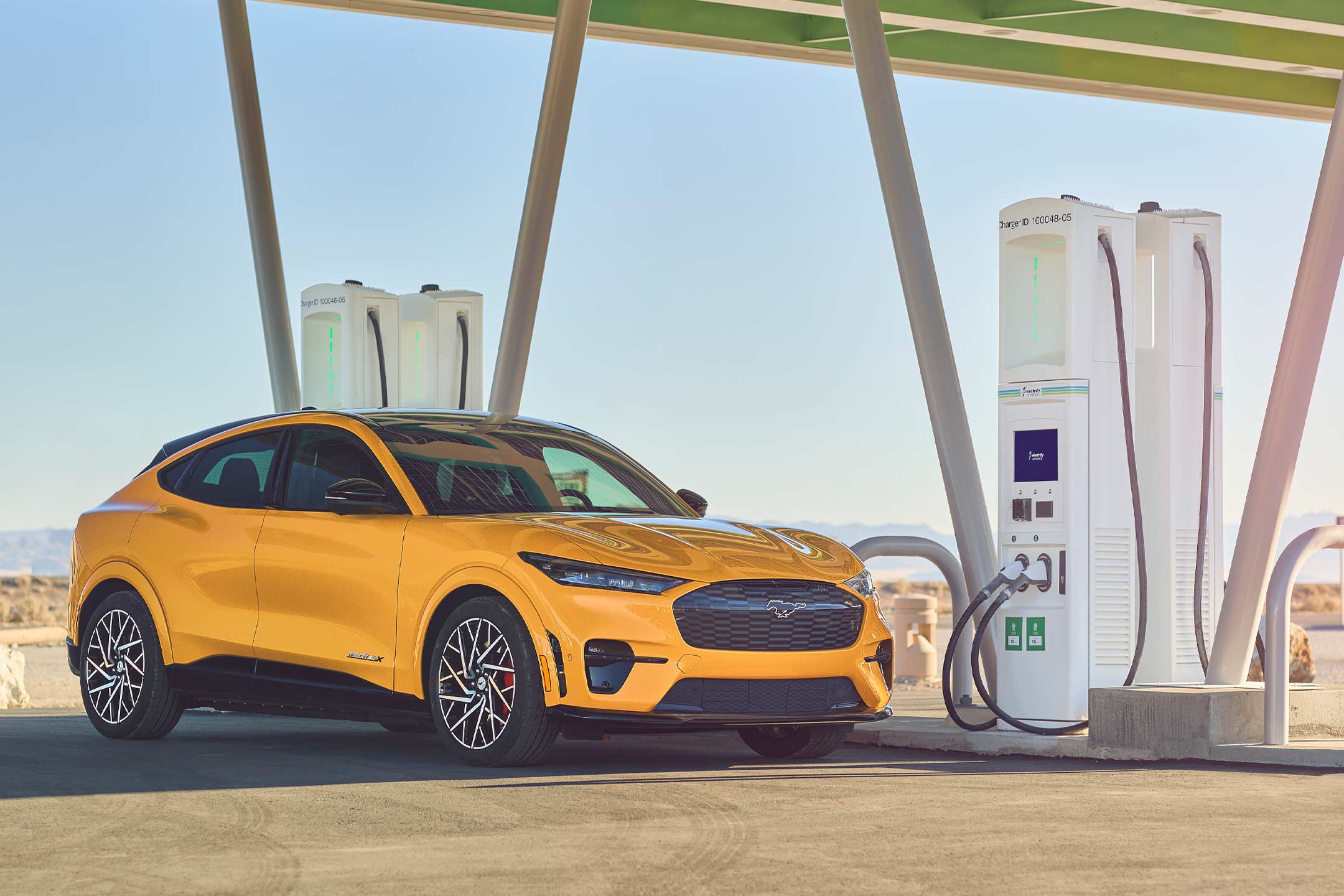
Power My Trip
A feature of FordPass Connect, the FordPass® App with the Power My Trip helps you plan your next road trip. In a few steps, find convenient charging stations, charging prices and times — all along your route.
*FordPass App, compatible with select smartphone platforms, is available via a download. Message and data rates may apply.
**FordPass Connect (optional on select vehicles), the FordPass App., and complimentary Connected Service are required for remote features (see FordPass Terms for details). Connected service and features depend on compatible AT&T network availability. Evolving technology/cellular networks/vehicle capability may limit functionality and prevent operation of connected features. Connected service excludes Wi-Fi hotspot.

The Mega Power Frunk
With easy access and 14.1 cubic feet of cargo space, there's room for everything from from groceries to tools. A drainable floor is easily hosed out. Equipped with four 120V outlets and two USB charging ports, it delivers the power you need for essential devices including power tools.

Home Backup Power
If power goes out in your neighborhood, with he extended range battery your F-150® Lightning® has the ability to power your home for three days. Or even up to ten, if usage is properly rationed.*
*When home is properly equipped and home transfer switch disconnects home from the grid. Based on 30 kWh use per day using the F-150 Lightning with the extended-range battery. Your results may vary based on energy usage. Rationing power assumes limiting the number of devices and turning the truck off when not needed.

Ford BlueCruise
Available Ford BlueCruise* feature works on prequalified sections of divided highways called Hands-Free Blue Zones which allows you to drive with your hands off the steering wheel as long as you pay attention to the road ahead.
*Available feature. Includes a three-year connected service plan with regular map updates after which purchase is required. Requires FordPass App and modem activation. Driver-assist features are supplemental and do not replace the driver’s attention, judgment and need to control the vehicle. Ford BlueCruise is a hands-free highway driving feature. Only remove hands from the steering wheel when in a Hands-Free Blue Zone. Always watch the road and be prepared to resume control of the vehicle. It does not replace safe driving. See Owner’s Manual for details and limitations. 2023 Ford Mustang® Mach-E® Select includes a 90-day trial with the option to purchase a three-year connected service plan with regular map updates. Requires the FordPass App and modem.

Power My Trip
A feature of FordPass Connect, the FordPass® App with the Power My Trip helps you plan your next road trip. In a few steps, find convenient charging stations, charging prices and times — all along your route.
*FordPass App, compatible with select smartphone platforms, is available via a download. Message and data rates may apply.
**FordPass Connect (optional on select vehicles), the FordPass App., and complimentary Connected Service are required for remote features (see FordPass Terms for details). Connected service and features depend on compatible AT&T network availability. Evolving technology/cellular networks/vehicle capability may limit functionality and prevent operation of connected features. Connected service excludes Wi-Fi hotspot.
Are you thinking of buying an EV in Fairlawn, OH? At Montrose Ford, we have electric vehicles that fit your needs. But we also know you might have questions. Our electric vehicle FAQs should help you understand a few of the ins and outs of EVs.
What kind of maintenance services are required?
With fewer moving parts, most traditional engine servicing is not needed. Other items, like wiper blades, brakes and tires etc. will still need inspection on a regular basis and replaced as necessary.
How long do electric vehicle (EV) batteries last?
It’s a common misconception that EV batteries expire prematurely, but that’s not the case. Most new EVs come with a battery warranty that lasts eight years or 100,000 miles, whichever comes first.
What is the maintenance schedule for an EV?
We have recommended maintenance intervals for various parts and component systems based upon engineering testing. For your scheduled maintenance service intervals, visit https://www.ford.com/support/maintenance-schedule.
Every 12 Months or 10,000 miles
- Rotate the tires, inspect for tire wear and measure the tread depth.
- Perform a multi-point inspection (recommended).
- Inspect the brake pads, shoes, rotors, drums, brake linings, hoses and the parking brake.
- Inspect the cooling system coolant level, coolant strength, and the cooling system hoses.
- Inspect the halfshaft boots.
- Inspect the steering linkage, ball joints, suspension and tie-rod ends.
- Inspect the wheels and related components for abnormal noise, wear, looseness or drag.
Other Items
- Change Brake Fluid (Every 3 Years)
- Rotate the tires, inspect for tire wear and measure the tread depth. (Every 12 Months or 10,000 miles)
- Perform a multi-point inspection (recommended). (Every 12 Months or 10,000 miles)
- Replace the cabin air filter (Every 20,000 miles)
- Change yellow battery coolant (Every 200,000 miles)
What is the difference between a hybrid vehicle and an EV?
While an EV relies on battery power alone, a hybrid vehicle has one drive battery and a gasoline powered engine. It switches between electric and gasoline power, or a combination of both.
Is owning an EV cheaper than owning a gas-powered vehicle?
You may find that EVs tend to cost more to purchase than most gasoline-powered vehicles. However, properly operated and maintained, EVs can cost less to operate over the lifetime of the vehicle. Many traditional services are eliminated along with gasoline and diesel costs. Contact Montrose Ford at 330-302-2128 if you have more questions or concerns. We’re happy to help.
Can an EV tow a trailer?
Most EVs are capable of towing. Always check the maximum towing capacity and follow all guidelines, ensuring your EV is properly equipped. Also, keep in mind towing impacts the range of all EVs.
Where can I charge my EV?
Besides your home, many parking areas and work environments. Also the government provides a map of all electric vehicle charging stations. You can search for locations in your area or along your route. Map out your route before you leave.
Do EVs have a transmission?
Most electric vehicles have a single-speed transmission. This eliminates the many complex gears and required fluid found in a traditional gasoline-powered powertrain.
Do EV batteries get recycled?
Ford is partnering with Redwood Materials to identify solutions for batteries that have reached the end of their useful lives. Together we are identifying pathways to help identify ways to make EV batteries even more environmentally responsible — and affordable — for our customers.
Can I Install the Ford Connected Charge Station Myself?
A Ford Connected Charge Station can be ordered from your Ford Dealer or FordParts.com. We highly recommend you hire a licensed electrician to do the installation as it involves a high degree of skill. Please provide these home installation tips to a licensed electrician to support an accurate installation quote.
Where Can I Find the FordPass® App?
The FordPass App is available through the App Store® and at Google Play™ and there is no charge.*
*FordPass App, compatible with select smartphone platforms, is available via a download. Message and data rates may apply. App Store is a service mark of Apple Inc. Google Play is a trademark of Google LLC.
How Can I Make Sure I Stay Charged and Moving When Planning a Road Trip?
Your EV comes equipped with the Power My Trip feature on the FordPass App with FordPass Connect. It identifies available charging stations, helping you plan your trip. It can identify charging stations along your route, access the cost to charge and power-level capabilities of those chargers. This app also helps you keep an eye open for Distance-to-Empty alerts. When you need to charge back up, you can use your FordPass Wallet or Plug & Charge feature to pay for your charge with no hassle at any of the 26,000 participating stations in the BlueOval™ Charge Network.
What Is the Optimal State of Charge and Impact on an EV Battery Life?
The optimal state of charge is between 90% and 15% because the battery’s state of charge can affect the longevity of the high-voltage battery. Draining the charge to below 15% can negatively affect battery health.
Can Weather Affect Battery Performance?
Yes, temperatures can have an affect on battery performance.
Tips for improving cold-weather range:
- Park in a garage whenever possible.
- Precondition the vehicle using the onboard technology to preheat its high-voltage battery while still plugged into the power source.
- Use heated accessories such as a heated steering wheel or heated seats, which are more power efficient than the conventional climate control system, to heat the whole cabin (when possible).
- When charging, ensure the HVAC system is turned OFF. (When preconditioning has been selected, the vehicle’s onboard technology, such as SYNC 4A, will automatically turn the HVAC system back ON.)
- If the vehicle is snow covered, brush all the snow off to eliminate extra weight and reduce aerodynamic drag.
Tips for improving hot-weather range:
- Park in a garage or under shade whenever possible.
- Precondition the vehicle using the vehicle’s onboard technology to precool the vehicle while it’s plugged into the power source, saving battery charge for the road.
- Select a moderate air conditioning setting because this feature requires more battery power to cool the cabin.

